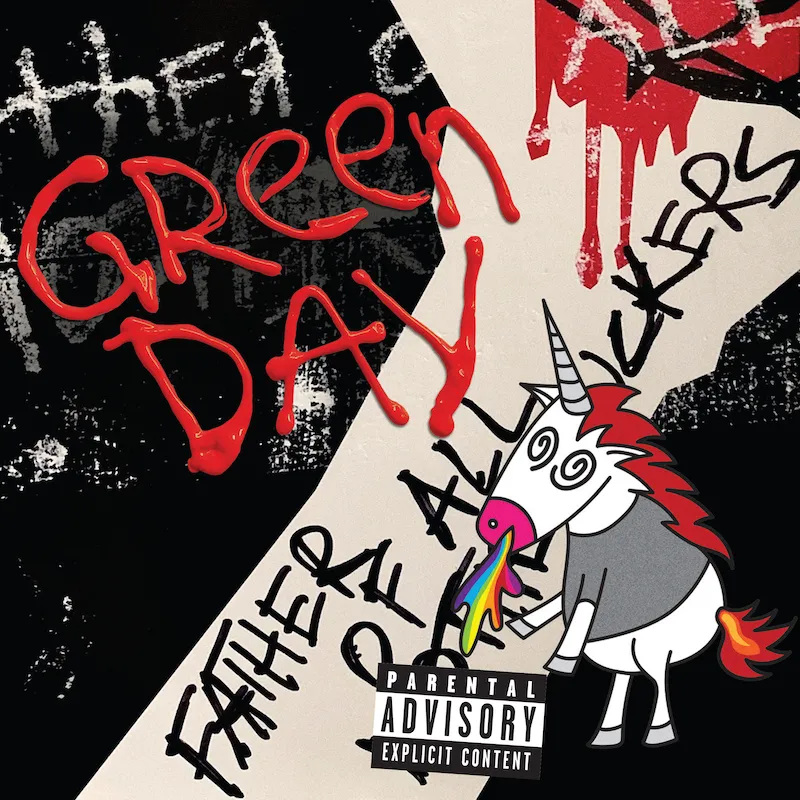Green Day’s latest album represents all that is wrong with modern rock
February 27, 2020
The cover art of “Father of All M***********” says about all that really needs to be said about Green Day’s latest album. A lazy recycling of the iconic cover of “American Idiot”—arguably their most popular album—“Father of All…” features a background ripped straight from the former, covered in sloppy graffiti and a cartoon unicorn that, at best, looks out of place. It’s a perfect representation of the music within the album: plodding and derivative. Now in their late forties, the cast of Green Day features aging, once-were punk rockers, and it’s easy to see that they’re quickly running out of ideas.
Green Day’s last release came in 2016 with “Revolution Radio,” which saw the band return to its punk rock roots. “Father of All…” sees the group delve deeper into that realm, resulting in their shortest album to date in their three decades of existence and an attempt to reignite what once made them icons in the genre. Unfortunately, this fails on nearly all levels. The music, heavily produced and lyrically dull, panders to its audience without any of the charm contained in their past.
It’s difficult to pick out highs on the album, seeing that most of the songs blend together with few notable melodies or riffs. Throughout most of the album, the traditional snare from the drums is replaced with a horrid handclap effect that seems to plead that the audience clap along, rather than invoking the effect naturally. Similarly, many of the tracks contain frontman Billie Joe Armstrong’s wails uncomfortably occupying the empty space in the left and right channels. On the third single, “Oh Yeah,” these elements come together to form a perfect example of boring, cut-and-paste, pop-rock, wannabe anthem. The chorus is hideous, auditory diarrhea as the tambourines and kick drum alternate behind a sampled chorus from Joan Jett & The Blackhearts’ “Do You Wanna Touch Me.” Immediately following is the track “Meet Me on the Roof,” which, at the very least, offers a break from the mellow-dramatics of the previous act. Peppy and upbeat, the track is earwormy, but lacks substance in its message, which is clearly—maybe a bit too clearly—influenced. Subsequent tracks “I Was a Teenage Teenager” and “Stab You in the Heart” both take their titles from their choruses, with the former giving in and preaching to a younger demographic. A three-and-a-half-minute song—which is long in the context of the album—with repeated verses and choruses, it manages to say little to nothing at all about what life is like for teenagers. “Stab You in the Heart” drowns in its influences, again leaving little behind in terms of lyricism and incorporating an oft-overused, 50’s inspired chorus riff in possibly the most unflattering of ways. Next up is “Sugar Youth,” a song that notably incorporates a vocal line from 2004’s “She’s a Rebel”. Otherwise, the handclap chorus throws off the feel of yet another song. “Junkies on a High” is perhaps the most irritating song of the album, with little electronic yips echoing in the background and a slow, undeveloped pace that goes nowhere and predictably becomes as forgettable as the rest of the album. The closer, “Graffitia,” does its job in mediocre fashion. A more interesting instrumental grooves in the background, and the lyrics contain some subtle and not-so-subtle social commentary (A staple of the band’s past work), but the song drags—impressive for a song barely edging three minutes—and loses interest before fading out and ending the album.
“Father of All…” isn’t completely devoid of highs, though there are few to come by. The opener of the same name is an interesting—albeit only moderately successful—departure from pop punk standard, and the chorus contains a hint of the energy of the band’s youth. Unfortunately, the verses see Armstrong’s vocals rise into a craning falsetto, and the following track, “Fire, Ready, Aim,” continues with the same tempo and chords, almost a continuation of the opener, which is in no need of a continuation.
The best track on the album—by far—is the penultimate title, “Take the Money and Crawl,” which, save for one lyrical misfire in the final chorus, represents a much more attractive image of what modern-day Green Day could be. The song is short—just over two minutes—but its hook is catchy and punchy, the guitars sitting loud and present in the mix with slightly distorted vocals in the verses. The chorus shines, fast paced and angry, and matches with the verses. It also is one of the only songs to not feature handclaps, a welcome sound for sore ears.
Ultimately, the album is a pathetic piece of lazy, boring, diluted and misguided songwriting with almost no replay value whatsoever. It’s disappointing on all levels, especially seeing that it’s been four years in between releases. If the intention had been a back-to-basics album that focused on the well-received aspects of the rock genre, the band went a little too basic and lost any character that their music had left. Green Day stated on release that “Father of All…” envelops “26 minutes of pure rock.” If this is what today’s “pure rock” and roll has come to, it’s a mere sputtering shell of the past.
Rating: 2/10
Favorite song(s): Take the Money and Crawl
Least favorite song(s): Oh Yeah; Junkies on a High; Fire, Ready, Aim; I was a Teenage Teenager






































